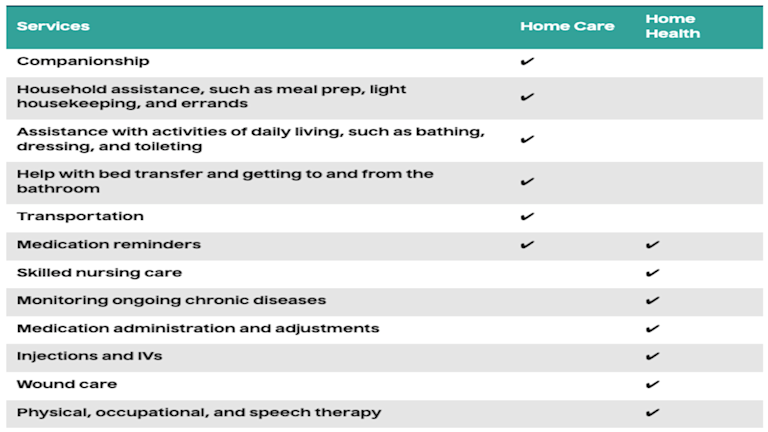The Difference Between Home Health and Home Care
There are important distinctions between a certified home health agency (CHHA or HHA) and a licensed home care services agency (LHCSA or HCA).
Get insurance benefits, legal documents, and medical records in one place

Helpful Highlights
Care provided by a certified home health agency (CHHA or HHA) requires a provider order; care provided by a licensed home care services agency (LHCSA or HCA) does not.
Home health care involves intermittent, short-term medical care from licensed healthcare professionals; home care involves non-medical assistance with daily activities from non-licensed caregivers (with nurse-delegated or "private duty" exceptions).
Home health care is covered in part or in whole by all insurance plans; home care is largely private pay (with managed long-term care and Medicaid plan exceptions).
The terms "certified home health care" and "licensed home care" are often used in the context of healthcare services provided in the home, but they refer to different types of services and are subject to varying regulations.
Home health care involves skilled medical services provided by licensed healthcare professionals and is often associated with Medicare (or other insurance) reimbursement.
Home care provides non-medical assistance with daily activities and is subject to state regulations, with services often paid for out-of-pocket by individuals or their families. It's important to check the specific regulations in your state, as they can vary, and some home care agencies may also offer "private duty" skilled services (nursing and therapy).

Certified home health (CHHA or HHA), in detail
Home health implies that your loved one has one or more conditions warranting medical care and therapy in the home. Home health requires:
a provider order
that your loved one meets certain criteria for receiving these services at home (for example, being what's called "homebound")
treatment by licensed healthcare professionals
Among the licensed healthcare professionals that may be involved, a registered nurse or a physical therapist is required and they are responsible for coordinating care, though treatment may also involve an occupational therapist, speech therapist, home health aide, and/or medical social worker.
These professionals follow a care plan developed specifically to meet your loved one's needs, which is reviewed and approved by the ordering provider. The care plan outlines treatment goals and the planned interventions to reach those goals. Everything the healthcare professionals do for and with your loved one is mapped directly to the care plan. Progress toward care plan goals is reviewed with every home health visit, as well as evaluated every 30 days or with any change in condition, and the order for home health must be renewed by the provider every 60 days.
Home health care stops when care plan goals are met, progress toward care plan goals has ceased (your loved one has achieved their best), or the provider does not renew the order. Therefore, there are limits to how long home health care is delivered. It is considered intermittent, short-term care.
Certified home health agency means that the agency is in good standing with and can bill CMS (Centers for Medicare and Medicaid), and follows CMS home health care guidelines.
Home health care is covered in part or in whole by all insurance plans.
Licensed home care (LHCSA or HCA), in detail
Home care typically implies in-home care delivered by non-licensed caregivers and does not require a provider order.
These caregivers adhere to a service plan customized to meet your loved one's level and frequency of care needs, whether companion care, homemaking (IADLs), personal care (ADLs), or all three. Transportation may be made available with these services, as well, though not guaranteed.
There are home care agencies that do offer skilled care, which is considered "private duty" nursing or therapy. Availability of these skilled services varies by state (regulations) and agency.
Licensed home care is subject to state regulations, and licensing requirements may vary from state to state. These regulations require registration with the state, affect contracting and agency operations, and determine the training requirements and scope of care of the agency employees (what they can and cannot do in their roles). Three states remain that do not require home care agencies to be licensed by the state - Iowa, Massachusetts, and Michigan (as Ohio recently passed legislation requiring home care agencies to be licensed).
Services provided by licensed home care agencies are often private-pay, meaning they are not typically covered by health insurance or Medicare. Rather they are paid out of pocket by individuals and their families. That said, some managed long-term care and Medicaid plans do cover home care services and private-duty nursing.
RESOURCES
AARP - Rules Limit Tasks for Home Aides
ChatGPT - The difference between certified home health care and licensed home care
Medicare.gov - Medicare & Home Health Care
National Council on Aging (NCOA)
No content in this app, regardless of date, should ever be used as a substitute for direct medical advice from your doctor or other qualified clinician.
Get more support and guidance on insurance benefits, medical records and legal forms.
Helpful brings together your insurance benefits, legal documents, and medical records in one personalized place — so you always know what you have, and never have to search again.

Technology for Health Tasks. Mental Health for the Tough Stuff.
Helpful connects your medical records, insurance, and caregiving tasks automatically. And when you need more than logistics, a therapist is here to guide you.
In-Network and Covered
For Individuals, Couples and Families
HIPAA Compliant, Data Stays Private


Healthcare Tasks Simplified

From syncing records to spotting drug interactions, Helpful does the heavy lifting, turning complex health info into clear tasks and showing you benefits you can actually use, giving you clarity and control over your care.

In-Network Mental Health

Our licensed therapists are here to support you and your loved ones through stress, burnout, and life’s hardest moments, with an inclusive, compassionate approach that works with most insurance plans.

Create Legal Documents

Plan ahead by creating will, trusts, advance directives and more, that ensure your wishes are honored in the event you can’t speak for yourself -with Helpful guiding you every step of the way.